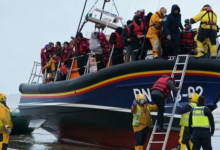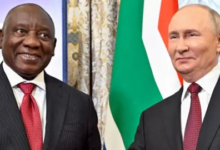‘I didn’t care whether I’d die in Mariupol or trying to get out’

We’ve been hearing about the situation in the besieged south-eastern Ukrainian city of Mariupol, where people are trapped without power, food or water amid intense bombardment and the dead are being buried in the street.
Our correspondent has been catching up with some of those who fled the city earlier in the war.
At a café in the city of Dnipro, which has itself has come under Russian fire, I met Oksana. With her husband Andrii, and her parents, she fled Mariupol last week through mined roads and a dozen hostile Russian army checkpoints.
They all politely turn down our offer of coffee. Oksana said it would be an insult to the family members they left behind in parts of Mariupol, from where it was impossible to flee.
“Absolutely we were taking a risk but at that point I didn’t care whether I’d die in Mariupol or die trying to get out,” she said.
Her husband, Andri, said there was no water supply in the city, no power, no heating and no communications so they had no choice but to go.
“We knew there was a chance we’d be targeted and we realised we had to risk it. If we would have stayed, the chances of surviving would be zero,” he said.
By Wyre Davies
BBC News, Dnipro





